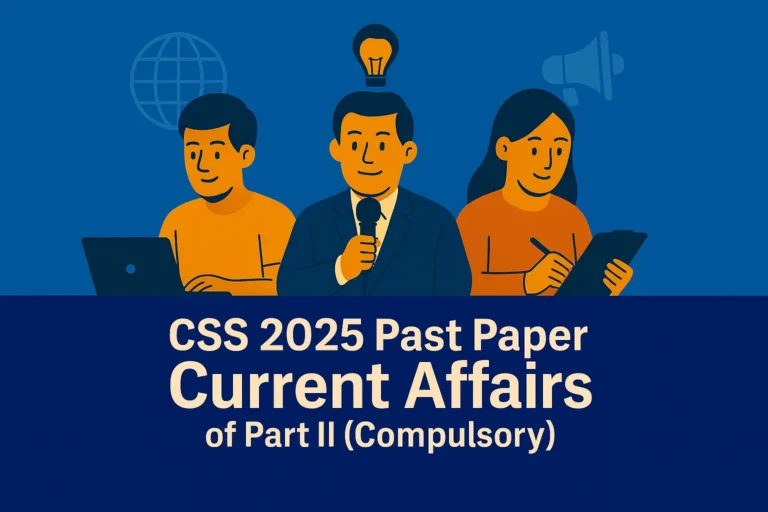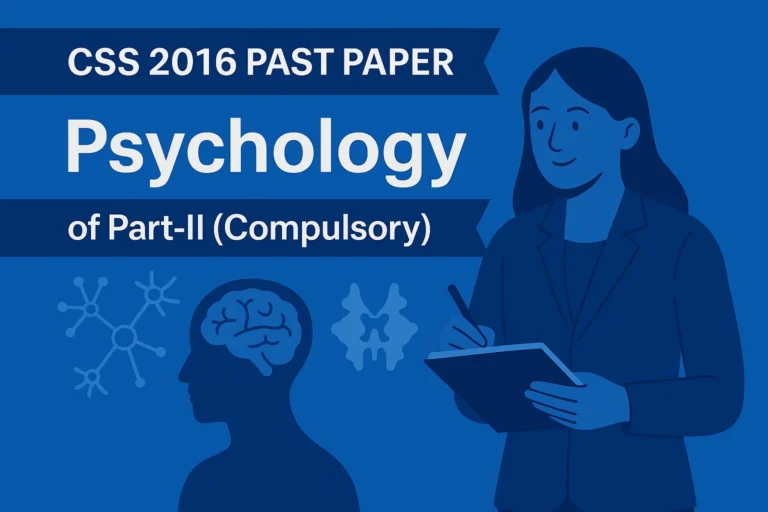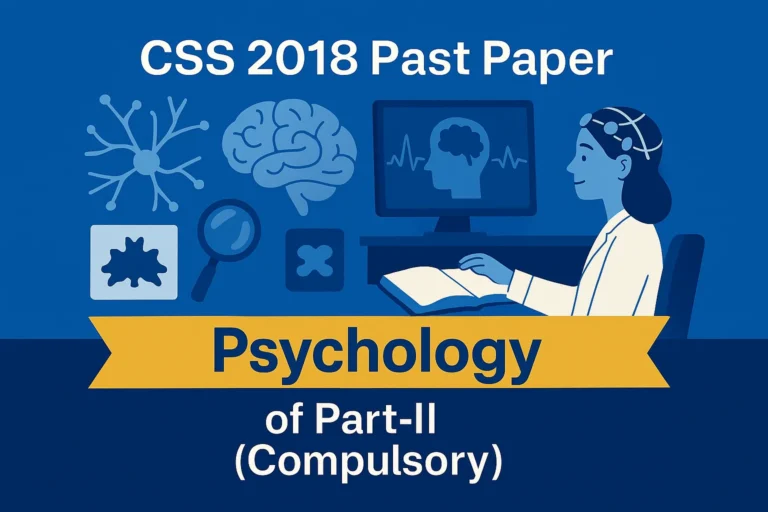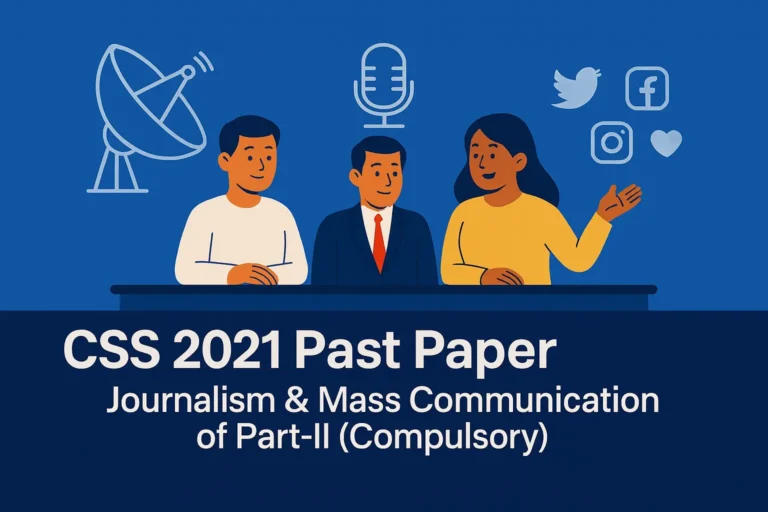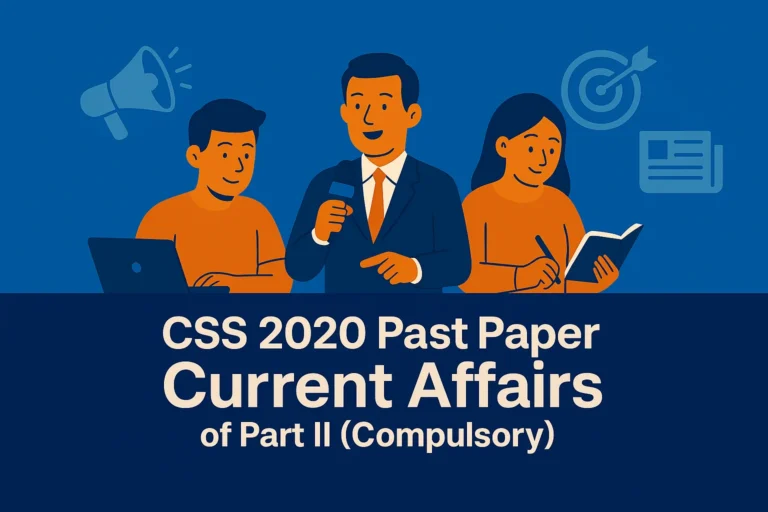Religion Has Done More Harm Than Help to Human Relations in the World
(English Essay – CSS & PMS)
Outline
- Introduction
- Misunderstanding of Religion in the Modern World
- Human Relations in the Secular and Globalised Era
- Religion as an Essential Bond vs. Modern Constraints
- Internet, Information, and Changing Perceptions
- Religion and Political Misuse
- Religion and Wars: A Historical Perspective
- Post-Cold War and the Clash of Civilisations Theory
- Islamophobia and 9/11 Propaganda
- Extremism, Terrorism, and Religious Identities
- Peaceful Messages of All Religions
- Human Relations and Religion’s True Role
- Punishments and Social Order in Religion
- Political Issues and Religious Agendas
- Israel-Palestine and Kashmir Issues
- Islamophobia in the West
- Politicisation of Religion and Media Manipulation
- Modern World, Religion, and Constructive Role
- Conclusion
Introduction
The 21st century is an age of information explosion, awareness, and shrinking boundaries. The global reach of information is utterly sweeping. Yet, it is difficult to understand why certain circles believe that religion has done more harm than help to human relations in the world.
Misunderstanding of Religion in the Modern World
New buzzwords have been added to dictionaries that are indicative of the caustic role of religions in the modern world. Words like Islamo-fascism, religious militancy, religious extremism, religious bigotry, Islamophobia, etc. have gradually found entry in normal day-to-day affairs.
Ironically, most religions are misunderstood and misinterpreted. The basic purpose of all religions is to prepare followers for a spiritual and material life. It is also true that religions don’t defy common sense. Nevertheless, it is widely believed that religions are vitiating human relations in the world.
Human Relations in the Secular and Globalised Era
Religions can torpedo human relations or unveil new chapters of cooperation. It is more pertinent to look at human relations and religion’s influence on them.
Human relations in the world are carried out collectively by nation-states, international and national organisations, social networking portals, and the internet. They also relate to each other via local social, cultural, and religious networks.
Religion as an Essential Bond vs. Modern Constraints
Religion does figure out as an essential bond between countries sharing the same faith, but in the modern world, human relations are not constrained by religion. Instead, the modern globalised world offers better options to states to repudiate any religious bias and work collectively for the betterment of humankind.
Internet, Information, and Changing Perceptions
The advent of the internet has brought a windfall of social-networking portals. It is astonishing to learn that people belonging to different faiths cooperate on economic, social, and cultural levels. The phenomenon of the proliferation of information has ushered in a new era.
People have come to know that living by religion alone is not enough. Instead, religion is a private affair, and it complements the spiritual and material needs of people.
Religion and Political Misuse
But the allegation that religion spoiled human relations in the world is outlandish. Most often, the political objectives of a group, country, or a banned organisation are mistaken for religious objectives. All charges against the alleged harm of religion can be addressed squarely.
Religion and Wars: A Historical Perspective
Critics of religions usually employ incendiary rhetoric to justify that religion is the culprit. They fan misnomers and misconceptions to drive home their nefarious agenda of maligning religion.
The very first example is of religion doing. The damage comes from religion-based wars. These days, it is fashionable to say that crusades between Muslims and Christians were holy wars and motivated by religion.
Post-Cold War and the Clash of Civilisations Theory
After the collapse of the Soviet Union in 1991, a vacuum was created because the war between the communist U.S.S.R and the capitalist U.S.A had come to an end.
This vacuum was filled by a sinister conspiracy theory that propounded that a clash was imminent between Western civilisation and Islamic civilisation.
Islamophobia and 9/11 Propaganda
In the wake of the 9/11 attacks on the U.S, the propaganda of Islam and Christianity being at daggers drawn doesn’t hold water. The fact that terrorists were Muslim doesn’t make relations strained between followers of different faiths.
George W. Bush, the president of the U.S.A., on the launch of war against Afghanistan, said ‘It is aimed to curb Islamic fascism. A deliberate impression was created which implied that fascism and Islam were inextricably linked together.
Extremism, Terrorism, and Religious Identities
Today, terrorists have embraced religious identities. They swap identities, which could be persecuted and exploited. Though it is widely acknowledged that extremism, terrorism, militancy, and animosity traverse all boundaries, some critics are still in confusion that religions sponsor them.
Peaceful Messages of All Religions
Peace, fraternity, cooperation, tolerance, accommodation, charity, and inter-faith harmony are the essential messages of all religions.
There is not a single religion that sanctions unjustified killing, marauding, and exploitation of its own followers or followers of other religions. The fact of the matter is that all religions promote humanity and common goodness.
Human Relations and Religion’s True Role
Human relations in the world always operate within a social, political, and economic order. If seen from this context, most religions don’t have a complete set of social, economic, and political order.
If Islam’s example is considered, it has a unique social, economic, and political order, which is based on Islamic teachings and injunctions.
Punishments and Social Order in Religion
If, for the sake of argument, it is admitted that religion creates fissures in human relations, then a simple example will suffice. Islam’s social order sanctions punishments for crimes such as theft, forgery, corruption, fleecing, etc.
In the modern world social order, punishments exist for the crimes mentioned in the above lines.
Political Issues and Religious Agendas
Some political issues that have become religious-centric have also attracted the attention of critics of religion and instigated religion-bashing. The Israel-Palestine issue is a magnet issue that attracts religious bigots and ideologies from all corners of the world.
Israel-Palestine and Kashmir Issues
Most religion-based terrorist organisations have mushroomed to justify their political designs in the garb of religion. Survival of such organisations is dependent on exploiting the issue.
The Kashmir issue is also a case in point. From Pakistan’s point of view, there are Islamic irredentist claims on Kashmir, which means that since the majority population of Kashmir is Muslim, Pakistan has a right to get it.
Islamophobia in the West
A perception is also gaining currency in the international circle that much harm has been done against religions and singling them out and their followers. Of late, a fresh wave of Islamophobia and Islam-bashing has started in the Western world.
Politicisation of Religion and Media Manipulation
The French Parliament banned the veil of women, citing it as a step to curb the influence of Islam and save the French ideals of Liberty, Equality, and Fraternity.
It is again a stunning indictment of the Islamophobic West, turning a social issue into an Islamic issue.
Modern World, Religion, and Constructive Role
In the modern world, many political and imperial battles are being fought ostensibly to stem Islamic fascism, Islamic extremism, and Islamic terrorism in the garb of religious wars, which are actually a war of resources.
In the fast-expanding world, religions can have a very constructive role. They can improve relations among different nations and followers of different religions.
Conclusion
It is not religion that has harmed human relations, but radicalisation, terrorism, extremism, and militancy. Suffice it to say that it is not religion that has harmed human relations in the world.
Click here to find more articles on English Essay.

